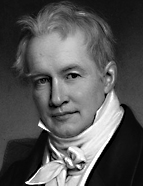

Alexander von Humboldt was one of the most outstanding intellectual figures of his time, leaving behind an immense repository of information and methods for the scientists who followed him. A traveller, writer, orator, courtier and naturalist, he had a decisive influence on the epistemological fields of ecology, geography and European history of discovery, both in his theoretical reflection on the subjects under debate and in the establishment of international networks for the transmission of such knowledge. Born in Tegel in 1769, on his family’s country estate, the “son of the German Enlightenment” studied at the commercial academy in Hamburg and the mining academy in Freiberg, and at the universities of Frankfurt and Göttingen. His travels through Spain, South and Central America, and the United States between 1799 and 1804 allowed him to meet Charles IV and the Spanish royal family, the archivist and historian Muñoz, and Thomas Jefferson, the erudite American president. On his return to Paris and Berlin (where he served as advisor, chamberlain and diplomat), he spent much of his long life publishing books on the materials and impressions he had gathered and compiling a colossal collection of some fifty thousand letters (Sandra Rebok, Humboldt and Jefferson..., 2014, pp. 5, 7-11, 13 and 53 and Andrea Wulf, The Invention of Nature , 2016, pp. 15 and 24-25). For the history of science and the historiography of the discoveries, it is important to note that the abusively named Baron Humboldt (Sandra Rebok, Humboldt and Jefferson... 2014, p. 47) maintained a correspondence and knew Abbot José Francisco Correia da Serra (1750-1823) and the 2 nd Viscount of Santarém (1791-1856), in addition to influencing, through his travels, the discovery of a Brazil closed to foreigners until the arrival of the court in Rio de Janeiro and the marriage of the heir to the crown to an Austrian archduchess (in 1808 and 1817, respectively). Even though he never crossed the border between Spanish and Portuguese America, Alexander von Humboldt contributed decisively, through his first-hand accounts, both printed and oral, to the flourishing of a popular and scientific fascination with an unknown Brazil, which French and Austrian cultural and scientific missions would seek to explore under the regency and reign of King João VI.
This work is financed by national funds through FCT - Foundation for Science and Technology, I.P, in the scope of the projects UIDB/04311/2020 and UIDP/04311/2020.
